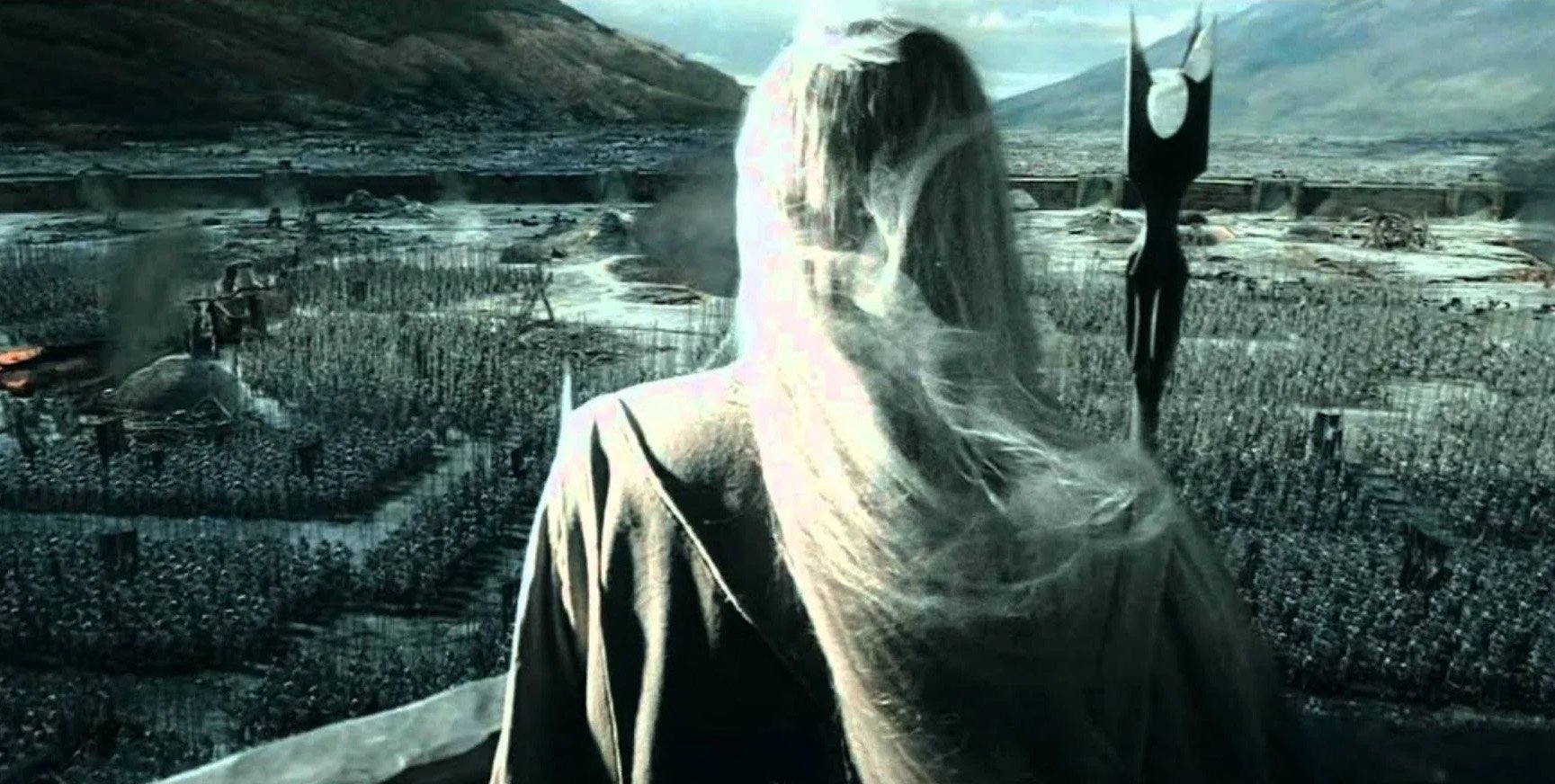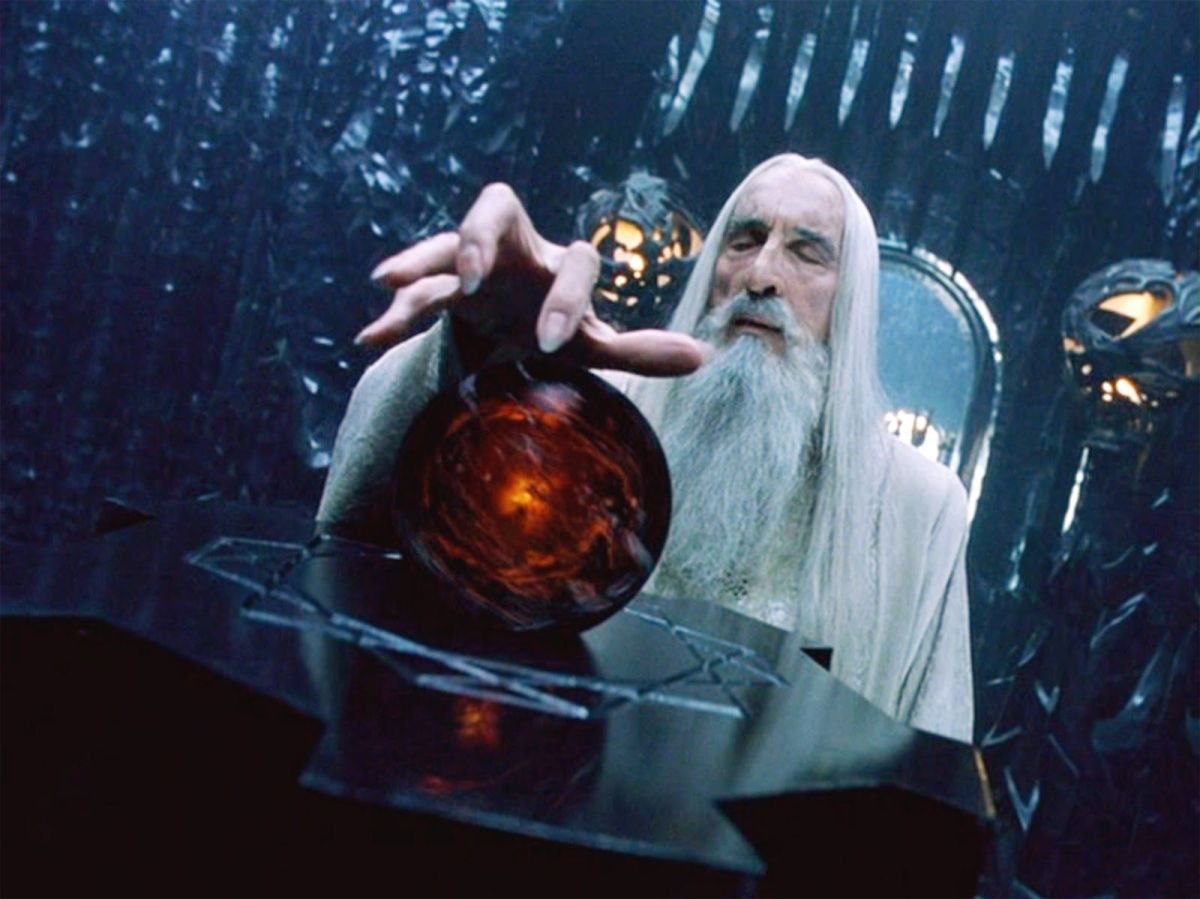Saruman the White is one of the most imposing and interesting characters in The Lord of the Rings. When we meet him, he’s the head of the order of wizards on Middle-earth, more powerful and learned than Gandalf the Grey. But it doesn’t take long to realize that he’s not the hero in the War of the Ring that Gandalf is.
Like Gandalf the Grey and Radagast the Brown, Saruman the White is a Maia. They are spirits dispatched to Middle-earth as three of five Wizards, or Istari, to support the free people’s fight against the growing threat of Sauron during the Third Age. Hailing from the Undying Lands, the Maia are immortal in a sense. Their spirits can resurrect upon death, although it’s not a guarantee.
The most obvious example in the trilogy is when Gandalf the Grey perishes battling the demonic Balrog in The Fellowship of the Ring. Divine intervention allowed the wizard’s spirit to be returned to his body as a reward for his sacrifice and because his mission to rally forces against Sauron wasn’t complete. Equipped with enhanced powers, he returned as Gandalf the White.
Upon his return, Gandalf became head of the Order of the Wizards because there was a vacancy. As we learned in dramatic fashion during The Fellowship of the Ring, Saruman had fallen to Mordor ahead of the War of the Ring as Sauron’s power grew. The chilling reveal results in a bruising fight where Saruman nearly takes Gandalf out of the equation. It’s a fight that proves that although the Istari resemble older men, they are immensely powerful beings.
But why would the highest wizard in the land join the fight for evil?
Was Saruman an ally of Sauron?

Saruman’s downfall was his pride, but the White Wizard didn’t simply join Sauron’s campaign against Middle-earth. The alliance forged between the two towers of Saruman’s Isengard and Sauron’s Barad-dûr wasn’t quite as it appeared.
In J.R.R. Tolkien’s epic tome, Gandalf describes Saruman as, “Great among the Wise… His knowledge is deep, but his pride has grown with it, and he takes ill any meddling. The lore of the Elven-rings, great and small, is his province. He has long studied it, seeking the lost secrets of their making…”
In some ways, Saruman’s downfall was a gamble that went wrong. The great wizard miscalculated under the weight of his immense knowledge and an over-estimation of his power. As it became clear that Sauron’s power was rising in the Third Age, the White Wizard sought an alliance with the dark lord of Mordor as a double-bluff. He hoped that by distracting Sauron and supporting his return to power, he could delay his plans while also exposing the location of the Ring of Power so he could seize it before the dark lord.
Ironically, considering his place in the Order of Wizards, Saruman is one of the rare gray characters in Tolkien’s books. He’s neither good nor bad, but it’s his muddled motives that draw him into the plot. The White Wizard truly believed that he could resist both the dark lord’s power and then, when in possession of it, the lure of the Ring of Power. He reasoned that his total control of Middle-earth was preferable to Sauron’s.
As such, Saruman never fully joined Sauron, but by binding his mission so closely to Sauron’s war efforts, it appeared that he was entirely in league with Mordor. He was undoubtedly an obstacle to the campaign to destroy the Ring of Power led by his one-time friend and later enemy Gandalf.
There was a hint of the character’s journey in his film casting. Sir Christopher Lee was a lifelong Lord of the Rings fan who professed to reading Tolkien’s complete saga once a year. It’s rumored that when the actor met the author, Tolkien gave him his blessing to play Gandalf. Lee had eyed the role of the Grey Wizard for decades, but Peter Jackson knew he was perfect for Saruman. After a screen career that had seen him play Dracula, Frankenstein’s monster, and Bond villain Scaramanga, Lee exuded the authority and menace to play one of The Lord of the Rings’ most interesting villains.
Why did Saruman fall?

The Istari themselves are proof that wizards aren’t immune to evil. The five wizards dispatched to Middle-earth in the Second age weren’t the first Maia to leave the Undying Lands.
Sauron was originally a Maia, too. Created by Eru, the supreme deity of Arda, he was initially one of the most powerful of his kind. In Sauron’s case, his fall came from his greatest virtue, the pursuit of order. He allied with other damaging forces to achieve this goal at all costs, leading the great and good Maia to be corrupted until he became an almost unstoppable threat to Middle-earth. Before he lost his physical form during the War of the Last Alliance that closed the Second Age of Middle-earth, Sauron would have passed for an aging man just like the wizards that followed him.
There was a precedent for the ordained creatures to fall, as Maia weren’t immune from weaknesses, especially when exposed to Middle-earth. In Saruman’s case, his power and knowledge drew him to a darker path. But it was his admiration of Sauron’s strength and envy of Gandalf’s popularity that pushed him on to it.
Saruman’s death differs between the book and film, although in both, the cause is a betrayal by his unlikely ally Gríma Wormtongue. Unlike Gandalf, Saruman’s actions denied him a resurrection or return to the West. Like Sauron at the end of the Second Age, his spirit was left disembodied, but unlike the dark lord, he was powerless.
Although Sir Christopher Lee was typecast as a villain for many years, Peter Jackson nodded to the actor’s great career when conjuring a new death for the fallen wizard. Staked on a spiked wheel, it’s a reference to the role of Dracula that the actor had played nine times before the White Wizard is dragged below the waters at the base of Isengard.

